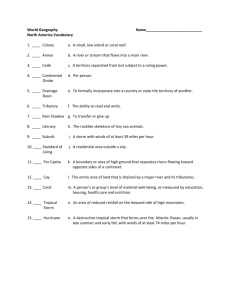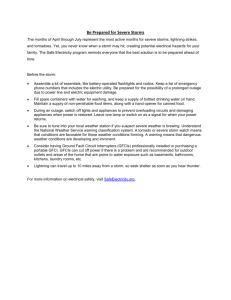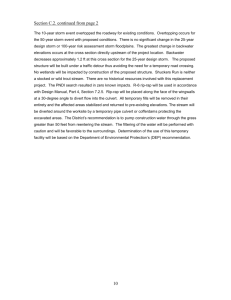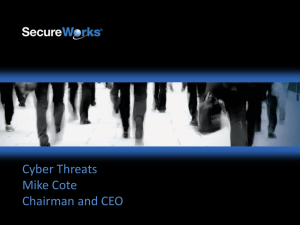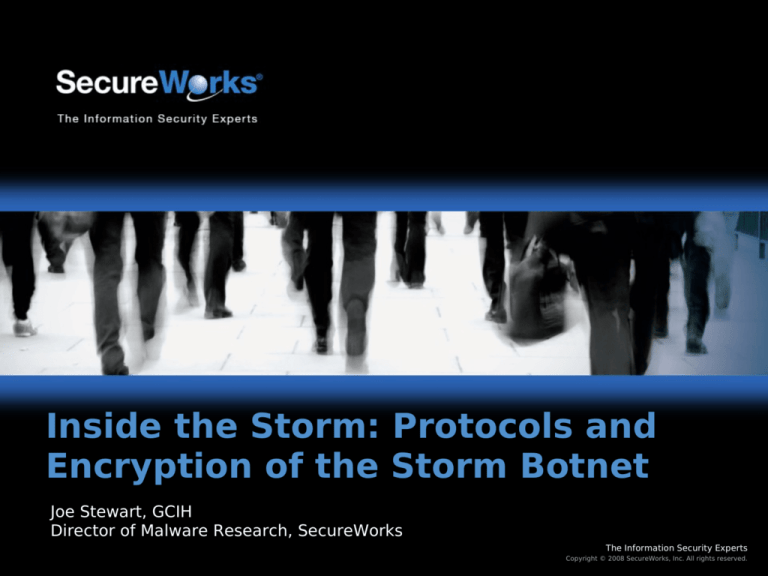
Inside the Storm: Protocols and
Encryption of the Storm Botnet
Joe Stewart, GCIH
Director of Malware Research, SecureWorks
The Information Security Experts
Copyright © 2008 SecureWorks, Inc. All rights reserved.
To be covered in this talk:
•
•
•
•
•
•
•
•
Quick-and-dirty unpacking of Storm
Structure of the Storm botnet
Introduction to the Overnet protocol
Storm's use of Overnet
Encryption algorithms within Storm
Storm node activation
Storm node communication
Notes on enumerating the Storm botnet
The Information Security Experts
Copyright © 2008 SecureWorks, Inc. All rights reserved.
Unpacking Storm (the easy way)
• Why do we need to unpack at all?
– Didn't you write Truman for behavioral analysis of stuff
like this?
• Storm installation procedure
– Dropper EXE installs rootkit
– Rootkit injects userland bot code on load
• Userland code is simply XORed inside kernel driver binary
• Extraction:
– Run in sandnet, grab dropped .sys file
– Extract, XOR and run (no anti-VM/debugging checks!)
The Information Security Experts
Copyright © 2008 SecureWorks, Inc. All rights reserved.
Locating the XORed EXE
The Information Security Experts
Copyright © 2008 SecureWorks, Inc. All rights reserved.
Locating the XORed EXE
The Information Security Experts
Copyright © 2008 SecureWorks, Inc. All rights reserved.
About Storm's “polymorphism”
• AV companies struggle to keep up with Storm variants
• The packing code changes every 10 minutes (controlled
server-side)
• However, the last-stage payload (XORed code) changes
much less frequently (on the order of months these days)
The Information Security Experts
Copyright © 2008 SecureWorks, Inc. All rights reserved.
Storm Architecture
The Information Security Experts
Copyright © 2008 SecureWorks, Inc. All rights reserved.
Storm Architecture
• Level 1: Apache C&C
• Level 2: Nginx 0.5.17 proxy
– Hides top-level Apache server somewhere in the world
• Level 3: Nginx 0.5.12 proxies (subcontrollers)
– Hide master Nginx host, listen in on Overnet traffic
• Level 4: Public nodes (supernodes)
– Act as reverse HTTP proxies to controller, fast-flux
nameservers
• Level 5: Private nodes (subnodes)
– Send spam or DDoS packets
The Information Security Experts
Copyright © 2008 SecureWorks, Inc. All rights reserved.
Storm encryption overview
• RSA is used for encoding controller list packet
• Other TCP communication: base64 and zlib compression
• For Overnet, Storm uses two different custom hash
permutation algorithms
• Authentication: 4-byte challenge/response
The Information Security Experts
Copyright © 2008 SecureWorks, Inc. All rights reserved.
Storm encryption overview 2
• Simple checksum algorithm used throughout Storm code:
The Information Security Experts
Copyright © 2008 SecureWorks, Inc. All rights reserved.
Overnet/Edonkey protocol overview
• Every file on Overnet is searched by its MD4 hash
• Basically it's a distributed hash table
– Storm uses Kademlia's DHT implementation
– Peers maintain a list of other peer hashes
– If a peer doesn't know the location of what you're
searching for, it will give you a list of peers closest to
your searched file's hash
The Information Security Experts
Copyright © 2008 SecureWorks, Inc. All rights reserved.
Storm P2P search
• Uses partial Overnet protocol
– Not for communication, but location information
• Instead of sharing files, Storm encodes information into the
hash itself – the current date and a checksum value
• 32 possible hashes are generated for each day of the year
(peers search + or – 1 day also)
• Subcontrollers search for current date hashes
• Subnodes search for current date -1900 years
The Information Security Experts
Copyright © 2008 SecureWorks, Inc. All rights reserved.
Generating a search hash set (part 1)
The Information Security Experts
Copyright © 2008 SecureWorks, Inc. All rights reserved.
Generating a search hash set (part 2)
The Information Security Experts
Copyright © 2008 SecureWorks, Inc. All rights reserved.
Publishing hashes
• Supernodes use Overnet publish packets to announce a
location hash to peers
• More encoded data:
– IP address
– Storm control TCP port
• Other peers in the network cache location hashes and
answer search queries
• Date hash in publish packet is state-dependent
– Unactivated: current_date
– Unactivated: current_date-1900 years
The Information Security Experts
Copyright © 2008 SecureWorks, Inc. All rights reserved.
Decoding a Storm search result hash
The Information Security Experts
Copyright © 2008 SecureWorks, Inc. All rights reserved.
Activation of supernodes
• Subcontrollers search for a published current date hash on
the network (unactivated Supernode)
• Subcontroller sends encrypted activation packet (BoL) to
IP/TCP port found in published hash
• Supernode decodes list of subcontroller hosts it can to relay
traffic to – it is now considered active
• Supernode begins to publish current_date-1900 years hash
so subnodes can locate them and connect to the control port
The Information Security Experts
Copyright © 2008 SecureWorks, Inc. All rights reserved.
Activation packet decryption
The Information Security Experts
Copyright © 2008 SecureWorks, Inc. All rights reserved.
Storm's private overnet
• Overnet is filled with poison peers, nosy botnet
researchers :)
• Storm's answer – keep the protocol, but encrypt the packets
– Creates a new network – only Storm nodes can talk to
each other
– Encryption is simple XOR by embedded key
– Could be used to segment botnets in case Storm author
feels like selling turn-key spam system
The Information Security Experts
Copyright © 2008 SecureWorks, Inc. All rights reserved.
Encapsulated HTTP relay
• Supernode listens on port 80 for HTTP requests
• Supernode relays zlib-compressed traffic to subcontroller via
base64-encoded HTTP postdata
– Request is encapsulated inside Storm command
– Host IP HTTP header is added
• Nginx server passes HTTP request to master Apache server
• Reply from master is base64-encoded zlib-compressed data
• Reply is decoded and sent back to requestor
The Information Security Experts
Copyright © 2008 SecureWorks, Inc. All rights reserved.
HTTP relay flow
The Information Security Experts
Copyright © 2008 SecureWorks, Inc. All rights reserved.
Command packet exchange
• Subnode connects to TCP port of supernode
– Zlib-compressed protocol relayed to controller via
encapsulated HTTP requests as before
The Information Security Experts
Copyright © 2008 SecureWorks, Inc. All rights reserved.
Decoded protocol exchange
The Information Security Experts
Copyright © 2008 SecureWorks, Inc. All rights reserved.
Enumerating Storm
• Because overnet peers are constantly broadcasting their
presence, one can walk all nodes in the network and get a
count of the botnet size
• Brandon Enright at UCSD has done extensive work in
mapping Storm nodes on both the public and private Overnet
• More information:
http://noh.ucsd.edu/~bmenrigh/exposing_storm.ppt
The Information Security Experts
Copyright © 2008 SecureWorks, Inc. All rights reserved.
Questions?
The Information Security Experts
Copyright © 2008 SecureWorks, Inc. All rights reserved.
Thank You!
• And a special thanks to GW and Brandon Enright for their
insights during the development of this presentation
The Information Security Experts
Copyright © 2008 SecureWorks, Inc. All rights reserved.



